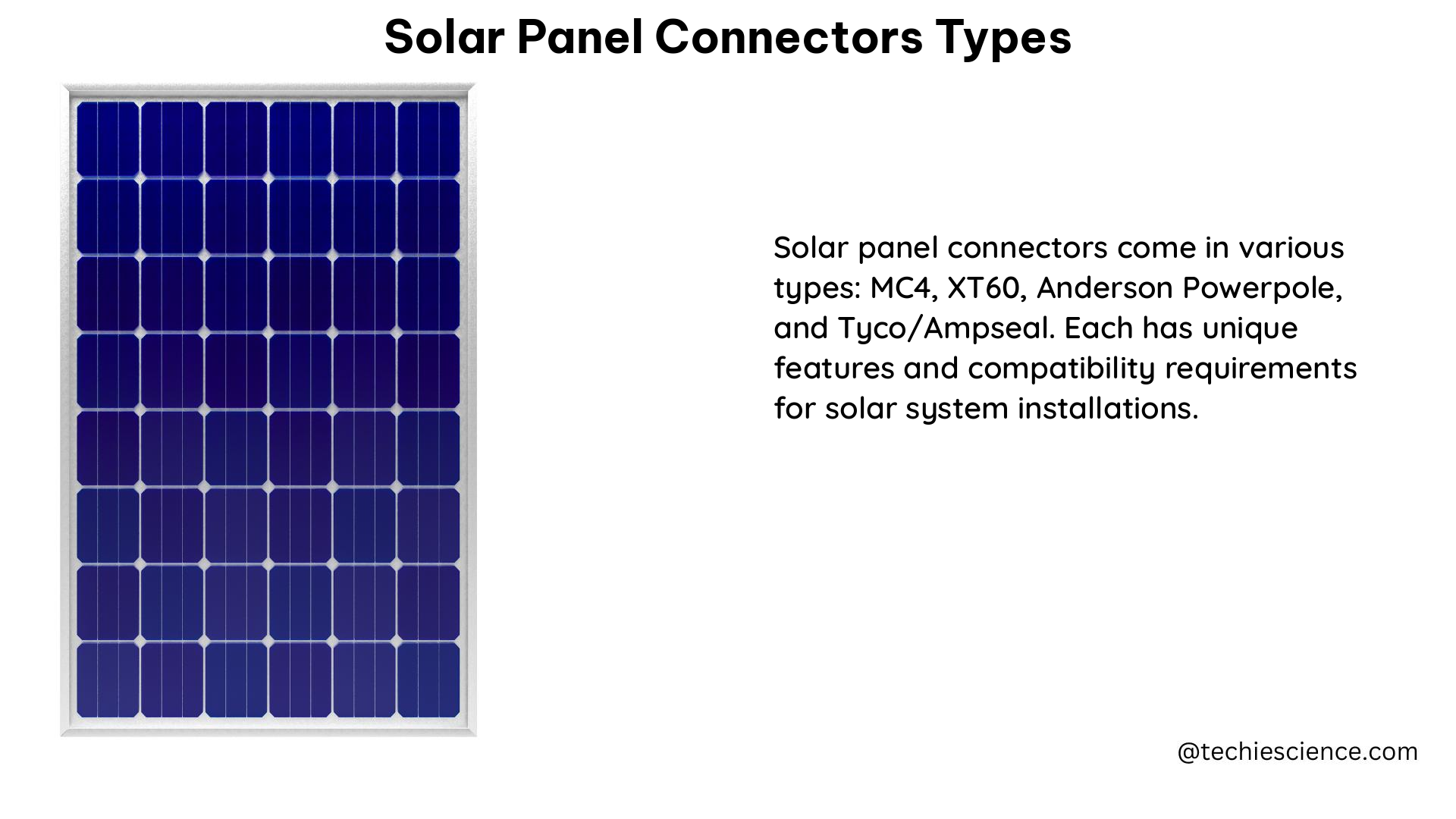Solar panel connectors are crucial components in photovoltaic (PV) installations, enabling secure and efficient electrical connections between solar panels and other system components. The types of solar panel connectors include the industry-standard Universal Solar Connectors, MC3, T4, TYCO SolarLok, and Radox.
Understanding the Technical Specifications of Solar Panel Connectors
When comparing popular solar connectors, it’s essential to consider their technical specifications, such as:
- Cable Cross-Section: The cross-sectional area of the cable that the connector can accommodate, typically ranging from 2.5 mm² to 6 mm².
- Contact Material: The material used for the conductive parts of the connector, often copper or brass, which affects the connector’s conductivity and corrosion resistance.
- Rated Current: The maximum current the connector can safely carry, typically ranging from 30A to 50A.
- Maximum Voltage: The maximum voltage the connector can withstand, usually between 600V and 1500V.
- IP Index: The Ingress Protection (IP) rating, which indicates the connector’s resistance to dust and water, ranging from IP65 to IP68.
- Maximum Temperature: The maximum operating temperature the connector can withstand, typically between 85°C and 120°C.
- Safety Class: The safety classification of the connector, such as Class II or Class III, which determines the level of protection against electric shock.
- Safety Mechanism: The features that ensure the connector’s safety, such as a locking mechanism, touch protection, or a disconnection tool.
- Locking/Unlocking Tool Requirements: The specialized tools needed to properly connect and disconnect the solar panel connectors.
These technical specifications can significantly impact the performance, safety, and longevity of the solar array.
The MC4 Connector: The Industry Standard

The MC4 connector, manufactured by Multi-Contact, is often considered the best option overall due to its ability to conduct higher currents and practical design. Its key features include:
- Cable Cross-Section: 4 mm²
- Contact Material: Copper alloy with tin plating
- Rated Current: 30A
- Maximum Voltage: 1500V
- IP Index: IP67
- Maximum Temperature: 120°C
- Safety Class: Class II
- Safety Mechanism: Locking mechanism and touch protection
- Locking/Unlocking Tool Requirements: MC4 connector tool
The MC4 connector’s high-quality materials and MULTILAM technology, which increases tension between female/male connectors to reduce moisture, contribute to its popularity and performance.
The Evolution of Solar Panel Connectors
The history of solar panel connectors dates back to 1883, with the invention of PV technology. However, it wasn’t until 1950 that the technology gained popularity, and the need for safe and easy-to-use solar panel connectors emerged.
- MC3 Connector (1996): The first significant development, featuring a 3 mm² contact pin.
- MC4 Connector (2004): Improved upon the MC3 with a 4 mm² contact pin, an efficient safety mechanism, and a practical installation design.
These advancements in solar panel connector technology have played a crucial role in ensuring the safety and reliability of PV installations.
The Importance of Solar Panel Connectors
Solar panel connectors play a vital role in ensuring power continuity and electricity flow throughout the solar array, reducing electrical resistance between PV modules, and minimizing electrical hot spots that could overheat wires or connectors due to loose connections or other factors. This reduces potential fire hazards and increases the safety of PV installations.
Selecting the Right Solar Panel Connectors
Understanding the technical specifications and historical context of solar panel connectors is crucial for selecting the right components for a reliable and efficient solar array. The MC4 connector, with its high-quality materials, MULTILAM technology, and ability to conduct higher currents, is often considered the best option overall.
However, it’s important to carefully evaluate the specific requirements of your solar installation, such as the system voltage, current, and environmental conditions, to ensure that the selected solar panel connectors meet or exceed the necessary specifications.
Conclusion
Solar panel connectors are essential components in PV installations, and understanding their technical specifications and evolution is crucial for ensuring the safety, reliability, and longevity of your solar array. By selecting the right solar panel connectors, such as the industry-standard MC4 connector, you can optimize the performance and safety of your solar energy system.
References:
– Understanding Solar Photovoltaic System Performance
– Solar Panel Connectors: Everything You Need to Know
– Types of Solar Panel Connectors

The lambdageeks.com Core SME Team is a group of experienced subject matter experts from diverse scientific and technical fields including Physics, Chemistry, Technology,Electronics & Electrical Engineering, Automotive, Mechanical Engineering. Our team collaborates to create high-quality, well-researched articles on a wide range of science and technology topics for the lambdageeks.com website.
All Our Senior SME are having more than 7 Years of experience in the respective fields . They are either Working Industry Professionals or assocaited With different Universities. Refer Our Authors Page to get to know About our Core SMEs.